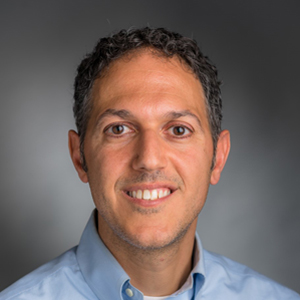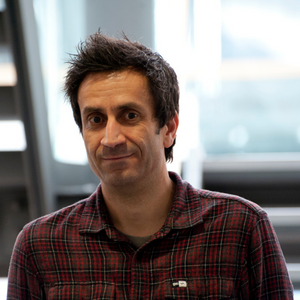Investigating transcription factors in development
Fast facts
- Official title: Alterations of oncogenic transcription factors as therapeutic targets in paediatric gliomas
- Lead researchers: Dr Rameen Beroukhim; Professor Chris Jones
- Where: Dana-Farber Cancer Institute, Boston, USA; The Institute of Cancer Research, London, UK
- When: January 2021 – December 2025
- Cost: £1,444,811 over five years
- Research type: Paediatric, High and Low grade, Academic
- Award type: Quest for Cures
What is it?
Gliomas are the most common group of brain tumours in childhood. Researchers believe that childhood cancers are caused when mistakes happen in the normal programmes of development. This is especially so for gliomas, which are often characterised by mutations in a group of proteins called transcription factors. Transcription factors have important roles in the regulation of normal brain development.
In this project, Dr Beroukhim and his team at the Dana-Farber Cancer Institute, along with Prof. Chris Jones at The Institute of Cancer Research, will investigate how, in children’s brain tumours, two specific transcription factors, known as MYB and PLAG, switch on developmental pathways that would normally be switched off. They will also determine how to switch off these transcription factors using new treatments.
Additionally, Dr Beroukhim and Professor Jones are collaborating with other leading researchers to develop new drugs that can specifically destroy these transcription factors as another way to treat paediatric gliomas.
This collaboration brings together investigators with diverse areas of expertise, including glioma and developmental biology, genomics and epigenomics and chemistry. They will use sophisticated model systems of paediatric gliomas to understand how mutations in transcription factors affect developmental pathways. The researchers will also use genetic and epigenetic methods to understand how these changes affect the other regulatory structures of cells, and the team’s chemists will develop strategies to degrade these proteins as a way to therapeutically ‘switch them off’.
Why is it important?
Brain tumours are the leading cause of cancer-related morbidity and death in childhood. While children with low grade gliomas are more likely to survive, they can be left devastated by both the tumours themselves and the treatments required to cure them. Children diagnosed with high grade gliomas face a fight for life, with a dismal prognosis. Better treatments for all gliomas are desperately required. This research will be directed to understanding how cancers hijack normal developmental processes and how this can be targeted in new treatments for children diagnosed with gliomas.
Who will it help?
This work is driving us towards a future where children diagnosed with a brain tumour, regardless of grade, have more effective, less harmful treatments available.
Our goal is to perform true bench-bedside-bench research, translating research findings into the clinical trials arena, while in turn, leveraging clinical trial experiences (and samples collected on the trials) to inform our basic science research.
Dr Rameen Beroukhim
Milestones
-
• The team have generated new preclinical models that express the MYB gene changes they want to investigate, and they have started characterising these models.
• Gene screenings have been done on MYB models and have begun to investigate how essential the MYB gene is for tumour cell survival.
-
• By creating models of tumours in the lab, the team have investigated two families of transcription factors known as MYB and LAG.
• This research has highlighted the important role that the family of PLAG proteins play in the formation of brain tumours in children. This discovery will help to focus their research to investigate ways to counter the effects of these PLAG proteins to help prevent tumour growth.
• The researchers are continuing to learn more about the MYB proteins specifically, how they grow and how they can be targeted without hurting nearby healthy tissue. They are now doing similar work for PLAG proteins.
-
• Using preclinical models, the team have shown that the MYB and PLAG proteins can cause changes in brain development. This could help the researchers to understand how these proteins can contribute to brain tumour development.
• The research team have also studied the effects of these proteins on the cancer cells to try to understand how these proteins cause brain cells to grow into cancers.
• They are exploring how certain genes are very important in tumour cells with these proteins and how these genes could be new targets for drug treatment.
• They are also working to identify drugs that can directly destroy PLAG and MYB family proteins. They have developed laboratory systems to measure the levels of these proteins cheaply, in preparation for testing thousands of potential drugs on the levels of these proteins. Molecules that appear to reduce the levels of these proteins will be starting points for drug development in future stages of the project.
Research is just one other way your regular gift can make a difference
Research is the only way we will discover kinder, more effective treatments and, ultimately, stamp out brain tumours – for good! However, brain tumours are complex and research in to them takes a great deal of time and money.
Across the UK, over 100,000 families are facing the overwhelming diagnosis of a brain tumour and it is only through the generosity of people like you can we continue to help them.
But, by setting up a regular gift – as little as £2 per month – you can ensure that families no longer face this destructive disease.
In this section

Dr Rameen Beroukhim
Dr Beroukhim is an Associate Professor of Medicine in the Cancer Biology department of the Dana- Farber Cancer Institute. Additionally he is a practicing Neuro-oncologist and brings expertise of both the clinic and the lab to this work.

Professor Chris Jones
Professor Jones is the Group Leader of the Glioma Team at The Institute of Cancer Research in London. His research focuses on understanding the biology of high-grade children’s tumours and using that knowledge to test targeted treatments.